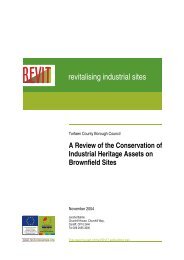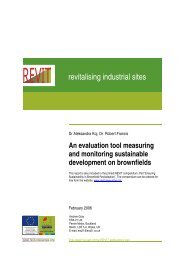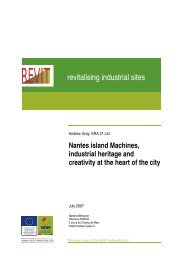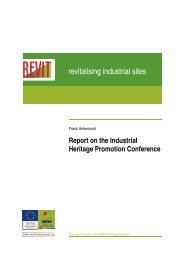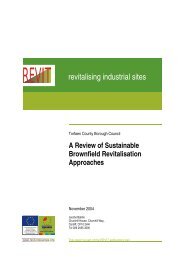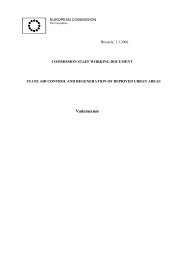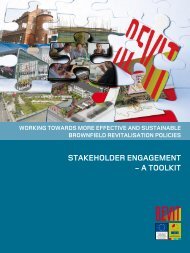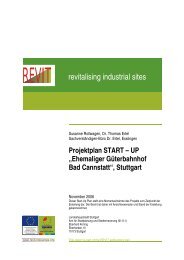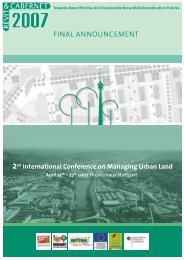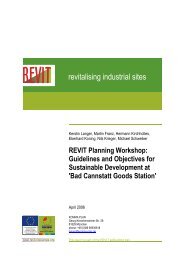Heritage Event Report.pdf - REVIT
Heritage Event Report.pdf - REVIT
Heritage Event Report.pdf - REVIT
You also want an ePaper? Increase the reach of your titles
YUMPU automatically turns print PDFs into web optimized ePapers that Google loves.
Session 4<br />
Industrial <strong>Heritage</strong> Tourism in Europe – a Resource and a Challenge<br />
(hyperlink to executive summary and presentation)<br />
Dr Wolfgang Ebert<br />
Wolfgang presented a wide range of examples of sites across Europe which have successfully used<br />
industrial heritage assets as the catalyst for regeneration of local economies. He emphasised the need<br />
and opportunities for heritage projects to innovate and to be delivered as part of a sectoral network. The<br />
ERIH network was used as a case study of such an approach, which is helping to link sites for tourism,<br />
conservation, training, and business benefits.<br />
Speaker profile<br />
Dr Wolfgang Ebert is involved as a consultant and academic in a range of industrial heritage<br />
projects across Europe. He has published widely on the issues surrounding regeneration of<br />
industrial heritage sites, is currently engaged on a number of large-scale mixed-use development<br />
projects, with a particular focus on promoting local economies through tourism and branding.<br />
Workshop 4 report<br />
Develop the case for or against the view that industrial heritage is important or not<br />
Main points raised in the case for heritage<br />
1. Community benefits<br />
• <strong>Heritage</strong> tourism can promote and focus community action<br />
• It is about people’s stories – celebrating this can bring a sense of pride and wellbeing<br />
• Industrial heritage tourism can bring substantial local benefits (e.g. Ironbridge)<br />
• It provides people with a positive image of perceived change for the better and<br />
reinforces a sense of place<br />
2. Sustainability benefits<br />
• <strong>Heritage</strong> can attract people to want to live in, return to, work in and visit an area<br />
• It can be the focus for improving and protecting a wider assortment of cultural<br />
features, including countryside, wildlife, traditional skills, products etc.<br />
• It is about identifying what and how features and sites can be best put to use for the<br />
future<br />
• <strong>Heritage</strong> makes sustainable use of existing assets and reduces the need to develop<br />
on green field sites<br />
3. Tourism benefits<br />
• <strong>Heritage</strong> regeneration is a response to a growing worldwide demand for cultural<br />
tourism destinations<br />
• It is critical that sites aim to emulate best practice (develop a world class product) in<br />
order to survive in an increasingly competitive market place<br />
• History is of interest to everyone, especially when it can relate to personal experience<br />
and identity<br />
4. Economic benefits<br />
• <strong>Heritage</strong> tourism produces and creates jobs and wealth in numerous supply<br />
industries<br />
• It promotes training in building and heritage management skills<br />
• <strong>Heritage</strong> can create a ripple effect of investment<br />
• <strong>Heritage</strong> contributes to a sense of place, a place in which people want to live and<br />
work and invest, both as visitor and resident<br />
• <strong>Heritage</strong> is an area’s USP!<br />
14



